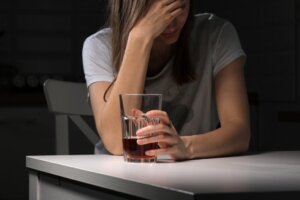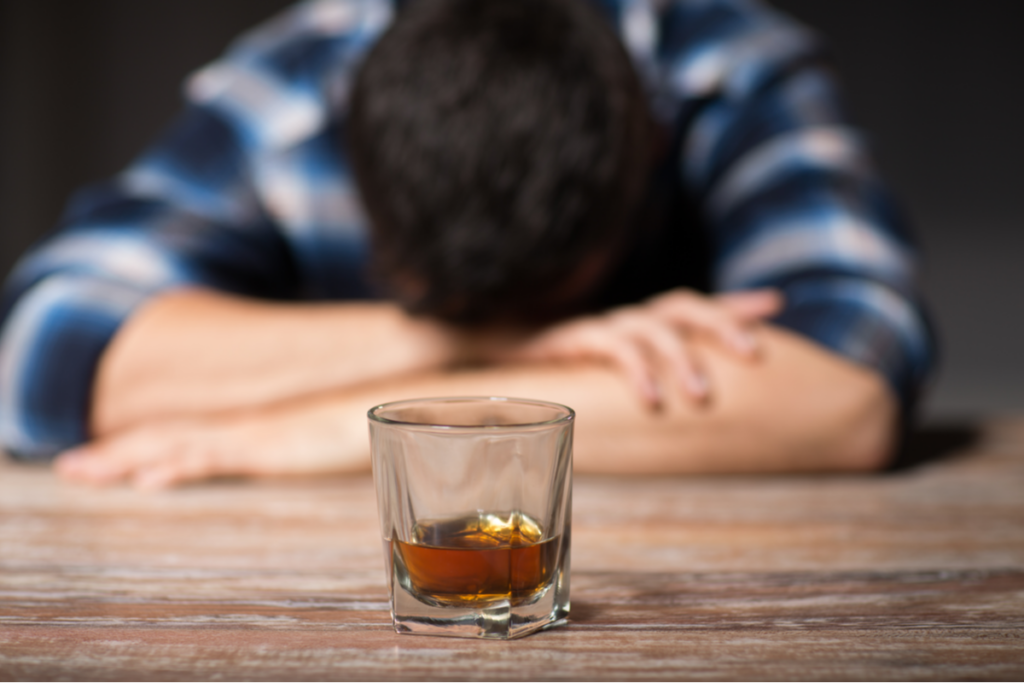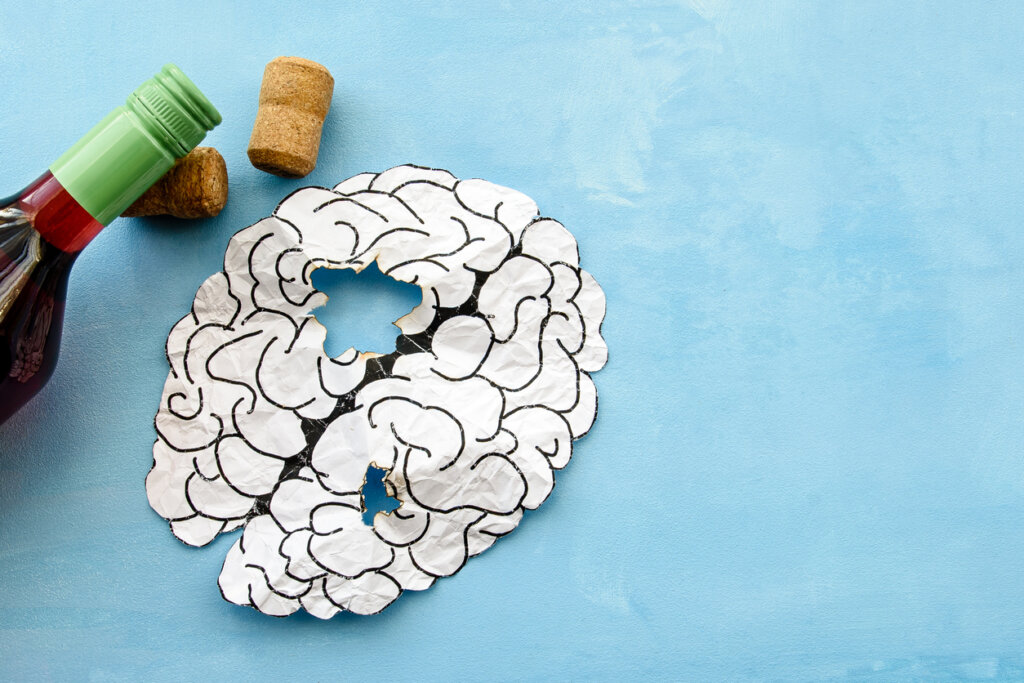Drinking Alcohol Makes You Sadder, Not Happier


Written and verified by the psychologist Valeria Sabater
Drinking alcohol doesn’t improve your mood. In fact, after that first moment in which it anesthetizes many of your inhibitions, it makes you more nostalgic, increasing your feelings of loss, and clouding your hopes for the future.
Therefore, despite the fact that it’s normal to have a drink when you’re socializing, that feeling of euphoria and disinhibition is both brief and fleeting. In fact, scientists doubt that drinking brings a sense of real joy even in the short term.
Nowadays, a good number of people (not just young people) consume a large amount of alcohol at the weekend. Parallel to this increase, we’re witnessing a rise in instances of anxiety and depression. They’re silent but latent shadows that gradually alter the well-being of everyday life.
That said, our society continues to feed false myths and distorted ideas, such as the classic myth that drinking ‘drowns our sorrows’. In reality, all it does is alter a series of brain mechanisms, acting, momentarily, as a sedative.
No problem is forgotten while in this state and no sorrow is completely dissipated by combining it with alcohol.
The scientific literature tells us that the more a person drinks, the more likely they are to develop major depression.

If drinking alcohol doesn’t improve your mood, what does it do?
Alcohol is a depressant. The problem lies in that its consumption is linked, above all, to situations of leisure and relaxation. Teenagers start drinking due to social pressure: “Everyone else is doing it so I might as well do it too”. Almost without realizing it, they end up being unable to even conceive of the act of going out and meeting others if there isn’t alcohol involved.
Something similar happens with people who, when faced with a vital challenge, turn to alcohol as a refuge. Whether they’ve just had a bad day, to more serious issues like losing a loved one enough or being unemployed, they seek solace in a bottle. Indeed, assuming that sadness is diluted with alcohol is a completely erroneous idea and science has been trying to tell us this for years.
Therefore, we need to reformulate the idea that drinking alcohol increases feelings of happiness. Because, in reality, not only does it make us feel worse, but it brings us closer to an abyss in which we can end up losing control. Furthermore, it can often act as a catalyst for more than one mental disorder.
Alcohol, a double-edged sedative
Humphrey Bogart claimed that he didn’t trust anyone who didn’t drink. He felt like everyone else was always three drinks behind him, and if they all had a few drinks there’d be no trouble in the world as they’d loosen up. It’s evident that our culture has built a layer of misguided glamor around the idea of alcohol.
We normalize it in such a way that it doesn’t surprise us, for example, that many of the actors in American series and movies almost always have a drink in their hands. It’s assumed that almost everyone makes habitual use of alcohol.
Resorting to alcohol in low amounts certainly has a sedative effect. In fact, if it cheers us up it’s because of its inhibitory mechanisms on the brain. Drinking doesn’t bring us real happiness or joy, but it relieves stress, makes us more outgoing, and facilitates social connection. However, things change when consumption goes from being functional to dysfunctional. Indeed, heavy drinking heightens worry and promotes a low sense of control and negatively valenced emotions.
People who suffer from depression but don’t realize it are more likely to become dependent on alcohol.
Alcohol and depression
Research conducted by the University of Nairobi (Kenya) claims that the prevalence of depression among people dependent on alcohol is 63.8 percent. These are worryingly high figures.
This study also suggests that it isn’t easy to determine which came first: depression or alcoholism. There’s such a fine line that it is almost impossible to tell. Many times, health professionals find themselves faced with frustrated patients (due to work or personal issues) who resort not only to drinking as an escape mechanism but also as self-medication.
The effects are evident:
- Lack of energy and persistent exhaustion.
- Feelings of worthlessness.
- Memory and concentration problems.
- Feelings of hopelessness and negativity.
- Low self-esteem.
- Irritability.
- Experiencing trouble in making decisions.
- Feelings of guilt, worthlessness, or helplessness.
- Insomnia or excessive sleep.
- Overeating or loss of appetite
- Psychosomatic symptoms such as stomach and digestive problems, headaches, etc.
Given this picture of emotional discomfort, it’s common for these individuals to seek access to psychotropic drugs and consume them without a medical prescription. This is dangerous and can have serious consequences.
The consumption of alcohol with psychotropic drugs is counterproductive. Furthermore, anxiolytics or antidepressants should never be taken without being prescribed by a doctor.

What can be done?
Some people find it impossible to think about the weekend without it involving consuming high amounts of alcohol. Nevertheless, later in the week, they find themselves feeling exhausted, irritable, and generally unwell. Moreover, in recent years, incidences of drunkorexia are appearing more frequently. This means that people stop eating on weekends for the sole purpose of drinking alcohol and to make its effects more intense.
What can be done in these situations? Obviously, education is essential. Understanding that drinking alcohol doesn’t improve mood, but worsens it would be a helpful message to give to children from a young age. That’s because it’s clear that our world links alcohol consumption to leisure, social connections, and relaxation.
If you’ve been dealing with feelings of hopelessness or uselessness related to alcohol use, you should talk to a specialist. Seeking the refuge of alcohol will only make any latent or minor depression lead to a major one. Also, if you feel your consumption of alcohol is beyond your control, don’t ignore it. Talk to your doctor.
Contrary to what Bogart said, the one you should trust is the one who doesn’t consume alcohol and who has full control of their life. That’s the key to wellness.
All cited sources were thoroughly reviewed by our team to ensure their quality, reliability, currency, and validity. The bibliography of this article was considered reliable and of academic or scientific accuracy.
- Kuria MW, Ndetei DM, Obot IS, Khasakhala LI, Bagaka BM, Mbugua MN, Kamau J. The Association between Alcohol Dependence and Depression before and after Treatment for Alcohol Dependence. ISRN Psychiatry. 2012 Jan 26;2012:482802. doi: 10.5402/2012/482802. PMID: 23738204; PMCID: PMC3658562.
- Megan N. Fleming et al. (2021) «A daily-life study of interpersonal stressors and alcohol use in individuals with borderline personality disorder and community controls».Drug and Alcohol Dependence, vol. 228, 2021
This text is provided for informational purposes only and does not replace consultation with a professional. If in doubt, consult your specialist.








